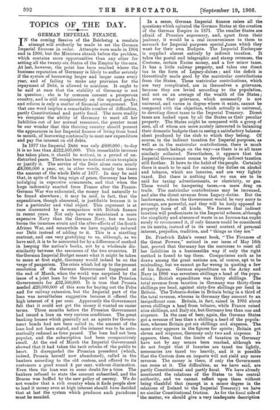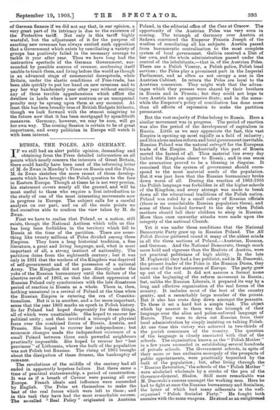TOPICS OF THE DAY.
GERMAN IMPERIAL FINANCE.
IN the coming Session of the Reichstag a resolute attempt will evidently be made to set the German Imperial finances in order. Attempts were made in 1904 and in 1906, but the Ministers shrank 'before the problem, which contains more opportunities than any other for setting all the twenty-six States of the Empire by the ears. At last, however, the point has been reached where the business reputation of Germany is likely to suffer severely if the system of borrowing larger and larger sums every year, and of failing to make any provision for the repayment of Debt, is allowed to continue. It ought to be said at once that the stability of Germany is not in question ; she is by common consent a prosperous country, and is still conspicuously on the upward grade ; and reform is only a matter of financial arrangement. Yet that one word implies a remarkable number of difficulties, partly Constitutional and partly fiscal. The more readily we recognise the ability of Germany to meet all her liabilities out of her normal resources, the greater must be our wonder that this thriving country should present the appearance in her Imperial finance of living from hand to mouth, of borrowing continually to meet new expenditure and pay the interest on old debts.
In 1877 the Imperial Debt was only £800,000 ; to-clay it is no less than £212,500,000. This remarkable increase has taken place, it should be noticed, in a period of un- disturbed peace. There has been no national crisis to explain or justify it. The service of the Debt alone costs nearly £8,000,000 a year, or, in other words, nearly ten times the amount of the whole Debt of 1877. In may be said that, in spite of the long reign of peace, Germany has been indulging in expensive armaments, and that when the huge indemnity exacted from France after the Franco- German War was exhausted, the money had naturally to be . found elsewhere ; it may be said, in fact, that the expenditure, though abnormal, is justifiable because it is for a particular and vital object. This argument is at once discounted by a comparison with British finance in recent years. Not only have we maintained a more expensive Navy than the German Navy, but we have borne the immense strain and the after-effects of the South African War, and meanwhile we have regularly reduced our Debt instead of adding to it. This is a startling contrast, and one very gratifying to us, although, as we have said, it is to be accounted for by a difference of method in keeping the nation's books, not by a wholesale dis- similarity between the resources of the two countries. If the German Imperial Budget meant what it might be taken to mean at first sight, Germany would indeed be on the verge of pauperism. The crisis which led up to the present resolution of the German Government happened at the end of March, when the world was surprised by the issue of a joint loan by the Imperial and the Prussian Governments for £32,500,000. It is true that Prussia needed £20,000,000 of this sum for buying out the Poles and for railway extension, but the Imperial part of the loan was nevertheless suggestive because it offered the high interest of 4 per cent. Apparently the Government felt that it could not get the money it wanted on easier terms. Three months before the Prussian Government had issued a loan on very curious conditions. The great banking houses which generally act as agents for Govern- ment bonds had not been called in, the amount of the loan had not been stated, and the interest was to be auto- matically reduced as time passed. The loan bad not been popular, and the subscription had been comparatively small. At the end of March the Imperial Government showed that it had taken the tacit rebuke of the public to heart. It disregarded the Prussian precedent (which, indeed, Prussia herself now abandoned), called in the bankers according to the old custom, and offered to its customers a good round 4 per cent. without diminution. Even then the loan was in some doubt for a time. The bankers refused to state the amount subscribed, and the Bourse was baffled by the new policy of secrecy. We do not wonder that a rich country when it finds people slow to lend it money even at high interest should have decided that at last the system which produces such paradoxes must be mended. In a sense, German Imperial finance raises all the questions which agitated the German States at the creation of the German Empire in 1871. The smaller States are afraid of Prussian supremacy, and, apart from their jealousy, it would be a real inconvenience to them to earmark for Imperial purposes special .taxes which they want for their own Budgets. The Imperial Exchequer is supplied almost entirely by indirect taxation. It takes the postal and telegraphic and stamp revenues, the Customs, certain Excise money, and a few minor taxes. It has a little railway property, and takes one direct tax in the form of Legacy-duties ; and the deficit is theoretically made good by the matricular contributions from the States. These matricular contributions, which are very complicated, are in themselves a grievance, because they are levied according to the population, and not on an average of the wealth of the States ; but even that grievance, which necessarily is not universal, and varies in degree where it exists, cannot be compared with the objection, which actually is universal, to devoting direct taxes to the Imperial Treasury. Direct taxes are looked upon by all the States as their peculiar property. The States might be compared with a group of men, all of whom are more acutely interested in balancing their domestic budgets than in seeing a satisfactory balance- sheet produced by the club to which they belong. Of course, in the indirect taxation for Imperial purposes, as well as in the matricular contributions, there is much waste—much leakage on the way—as there is in all taxes similarly collected. Nevertheless, it appears that the Imperial Government means to develop indirect taxation still further. It bows to the habit of the people. Certainly there is much to be said for raising the duties on alcohol and tobacco, which are luxuries, and are very lightly taxed. But there is . nothing that we can see to be said for taxing advertisements, or electricity, or gas. These would be hampering taxes,--a mere drag on trade. The matricular contributions may be increased, and also the direct revenue from Legacy-duties. But the landowners, whom the Government would be very sorry to estrange, are powerful, and they will be hotly opposed to property taxes of all kinds. We foresee that indirect taxation will predominate in the Imperial scheme, although the simplicity and absence of waste in an Income-tax ought surely to recommend it, if only finance could be considered on its merits, instead of in its usual context of personal interest, prejudice, tradition, and " things as they are."
Dr. Friedrich Zahn's recent book, " The Finances of the Great Powers," noticed in our issue of May 16th last, proved that Germany has the resources to meet all her liabilities in a businesslike way if only the right method is found to tap them. Comparisons such as he draws among the great nations are, of course, apt to be misleading, but we cannot go far wrong in quoting a few of his figures. German expenditure on the Army and Navy in 1906 was seventeen shillings a head of the popu- lation ; British expenditure was thirty shillings. The total revenue from taxation in Germany was thirty-three shillings per head, against sixty-five shillings per head in Britain. The Tobacco-duties in Britain bring in a third of the total revenue, whereas in Germany they amount to an insignificant sum. Britain, in fact, raised in 1905 about seven shillings a head from tobacco, while France raised nine shillings, and Italy six, but Germany less than one and sixpence. In the case of beer, again, the German States got a revenue of less than a shilling a. head of the popula- tion, whereas Britain got six shillings and sixpence. The same story appears in the figures for spirits; Britain got eleven and sixpence, Germany only two and sixpence. It appears, then, that the limits of taxation in Germany have not by any means been reached, although we do not forget that if luxuries are taxed too lightly, necessaries are taxed too heavily, and it is possible that the Custom dues on imports will not yield any more revenue. The money is there, if only the Government can come at it. The difficulties, as we have said, are partly Constitutional and partly fiscal. We have already mentioned the relations of the States to the central authority, and we cannot reflect upon them without being thankful that (except in a minor degree in the relations of Ireland to the Imperial Treasury) we have no similar Constitutional friction. As for the fiscal side of the matter, we should give a very inadequate description of German finance if we did not say that, in our opinion, a very great part of its intricacy is due to the existence of the Protective tariff. Not only is this tariff highly wasteful, but the adjustment of it for the purpose of exacting new revenues has always excited such opposition that a Government which exists by conciliating a variety of groups has positively failed in the necessary courage to tackle it year after year. Thus we have long had the instructive spectacle of the German Government, sur- rounded by possible sources of revenue, confessing itself unable to touch them, and living before the world as though in an advanced stage of commercial decrepitude, while Britain, under the elastic conditions of Free-trade, has been able quickly to put her hand on new revenues and to pay her way handsomely year after year without exciting any of those terrible apprehensions which afflict the dwellers in lands where a new nostrum or an unexpected penalty may be sprung upon them at any moment. At least this has been broadly true of British Budgets hitherto, though we look forward with the utmost misgiving to the future now that it has been mortgaged by spendthrift measures. Germany, however, we may be sure, will go her own way. The coming Session is certain to be of great importance, and every politician in Europe will watch it with keen interest.











































 Previous page
Previous page